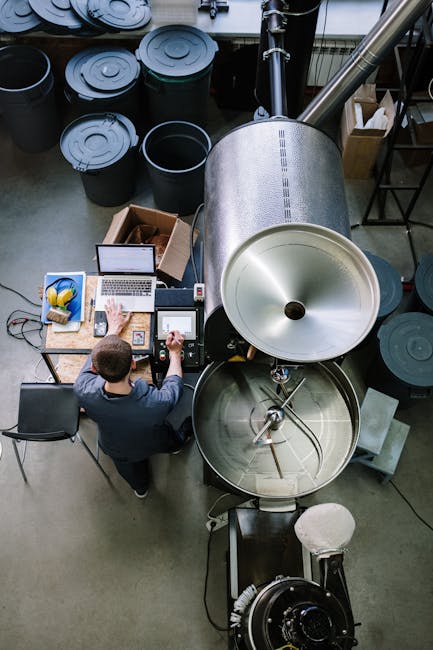
The Role of Affiliate Marketing in the Food and Beverage Industry
In today’s digital age, affiliate marketing has emerged as a powerful tool for businesses across various sectors, including the food and beverage industry. As consumer behavior shifts towards online shopping and digital consumption, companies are leveraging affiliate marketing to expand their reach, boost sales, and build brand loyalty. In this blog post, we’ll explore the role of affiliate marketing in the food and beverage industry, delve into its benefits, and offer actionable tips for businesses looking to capitalize on this trend.
Understanding Affiliate Marketing
Affiliate marketing is a performance-based marketing strategy where businesses reward affiliates (partners or influencers) for driving traffic or sales to their website through the affiliate’s marketing efforts. Affiliates use unique tracking links to promote products or services, and they earn a commission for each sale or lead generated through their link. This model creates a win-win scenario for both the brand and the affiliate, encouraging collaboration and mutual growth.
The Rise of Affiliate Marketing in the Food and Beverage Sector
With the rise of digital platforms and social media, the food and beverage industry has witnessed a significant increase in affiliate marketing activities. According to a report by Forrester, affiliate marketing expenditure is expected to grow to $8.2 billion by 2022, with the food and beverage sector playing a substantial role in this growth. This increase is driven by the industry’s need to reach broader audiences, engage with diverse consumer segments, and capitalize on the influence of food bloggers, Instagram influencers, and niche content creators.
Benefits of Affiliate Marketing for Food and Beverage Brands
The advantages of affiliate marketing in the food and beverage industry are manifold. Below are some of the key benefits:
1. Expanded Reach and Increased Visibility
Affiliate marketing enables food and beverage brands to tap into the extensive networks of their affiliates, reaching a wider audience than traditional marketing methods. Affiliates often have a dedicated following, and their endorsement can significantly boost a brand’s visibility. For instance, a vegan food company might collaborate with popular vegan influencers to reach health-conscious consumers who trust the influencer’s recommendations.
2. Cost-Effective Marketing Strategy
Unlike traditional advertising, which often requires significant upfront investment, affiliate marketing operates on a performance-based model. Brands only pay for actual sales or leads generated, making it a cost-effective strategy for businesses of all sizes. This approach allows food and beverage companies to optimize their marketing budgets and achieve a higher return on investment (ROI).
3. Enhanced Credibility and Trust
Consumers are increasingly skeptical of direct brand advertising, preferring to trust recommendations from peers or influencers. Affiliates, who often have a loyal following, can bridge this trust gap by providing authentic reviews and endorsements. When a well-respected food blogger recommends a new gourmet product, their followers are more likely to trust their opinion and make a purchase, enhancing the brand’s credibility.
4. Diverse Content and Creative Marketing
Affiliates bring their unique style and creativity to the table, creating diverse content that resonates with different audience segments. Whether it’s a recipe blog post, an Instagram story, or a YouTube video, affiliates can showcase products in engaging ways that traditional advertising might not cover. This diversity helps brands connect with consumers on multiple platforms and encourages them to explore the brand’s offerings.
Actionable Tips for Implementing Affiliate Marketing in the Food and Beverage Industry
For food and beverage brands looking to harness the potential of affiliate marketing, here are some actionable tips:
1. Identify the Right Affiliates
Select affiliates whose values and audience align with your brand. Use tools like social media analytics and influencer marketing platforms to find potential partners who share your target demographic. For instance, if your brand focuses on organic products, partnering with organic food bloggers can help you reach health-conscious consumers.
2. Provide Compelling Incentives
Offer attractive commission rates or exclusive discounts to motivate affiliates to promote your products. Consider providing personalized discount codes that affiliates can share with their audience, encouraging them to make a purchase.
3. Develop a Clear Communication Strategy
Establish open lines of communication with your affiliates to ensure they have the resources and support they need. Regularly update them on new products, promotions, or changes in your affiliate program. This proactive approach will strengthen your relationship and encourage affiliates to continue promoting your brand.
4. Track Performance and Optimize
Utilize affiliate tracking software to monitor the performance of your affiliates. Analyze metrics such as click-through rates, conversion rates, and sales to identify top performers and areas for improvement. Use this data to refine your strategy and optimize your affiliate marketing efforts.
Case Studies: Successful Affiliate Marketing in the Food and Beverage Industry
Here are some examples of food and beverage brands that have successfully leveraged affiliate marketing:
HelloFresh
HelloFresh, a popular meal kit delivery service, has effectively used affiliate marketing to expand its customer base. By collaborating with food bloggers and influencers, HelloFresh reaches diverse audiences who are interested in convenient, healthy meal options. Through affiliate links and promo codes, the company provides value to consumers while driving sales and increasing brand awareness.
Blue Apron
Blue Apron, a pioneer in the meal kit industry, utilizes affiliate marketing to maintain its competitive edge. The company partners with lifestyle bloggers and health influencers to promote its offerings, focusing on the convenience and quality of its meal kits. By leveraging the credibility of its affiliates, Blue Apron builds trust with potential customers and encourages them to try its service.
Conclusion: Embracing Affiliate Marketing for Growth
Affiliate marketing offers a wealth of opportunities for food and beverage brands to expand their reach, build trust, and drive sales. By partnering with affiliates who share their values and audience, brands can effectively navigate the digital landscape and connect with consumers in meaningful ways. As the industry continues to evolve, embracing affiliate marketing as a core component of a comprehensive marketing strategy will be key to achieving long-term success and growth.
Do you need your own Affiliate Marketing Expert? Try the chatbot for free


